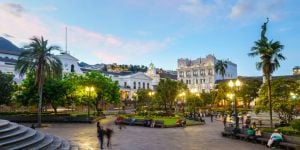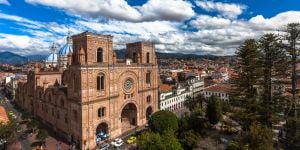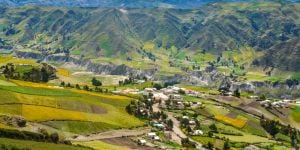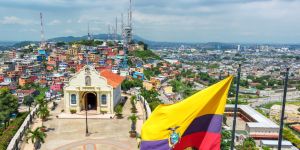Gringos speakin' some Espanol
I know the topic of learning Spanish comes up frequently on these threads, so I want to give it a home where we can discuss to our heart's content, hopefully in one place so that the information and experience doesn't get unfindably scattered all over the forum.
I took a couple of years of Spanish in college (UT) in the 1980's. I literally started from ground zero nothing, no previous experience. I struggled. Most of the other students had at least one year of high school Spanish in their backrounds.
My first Spanish instructor was a teaching assistant who had spent years in Peru, and presumably spoke Peruvian Spanish. She was good, her language seemed clear. The second instructor was Cuban, and it sounded nothing like the previous Peruvian Spanish. I found the Cuban difficult. The third instructor was from Spain and she spoke classic Castillian Spanish, lisp and all. And that was where I gave up. Couldn't understand a thing she said.
There seem to be many Spanishes.
I was talking to some day laborers at Home Depot a couple of years ago, they were mostly from central American - Guatemala, El Salvador. They sounded nothing like the Mexican Spanish I'd been listening to in Texas for 20 years.
Then there's TexMex and Spanglish hovering around the perimeters of both languages.
I did notice some differences in Ecuador as well. For instance street stop signs in EC said 'Pare' where in Mexico they use 'Alto'. I was talking to a boy in Quito who was wanting to polish my shoes and I asked him why he wasn't in school, 'escuela'. He had no idea what I was babbling about. Then later from our hostal balcony I saw the school buses go by on the street below and on top of the buses was written 'escolar'. (you'd think he could have made the leap from escuela to escolar...but)
Commonly spoken Spanish also seems heavily dependent on idioms and turns of the phrase, if you will. As is English. English is much harder to learn as a second language than people think because we use so many common idioms that are not of formal English construction. I once told a EFL friend that I couldn't do something because I "was broke." He asked what had broken.
So I thought I'd kick this off hoping for a lively discussion.
When I was getting ready to spend a semester in Costa Rica in the mid-1970's, I crammed a year of college Spanish into 6 months. In high school I had taken 4 years of Latin and two of French, so I thought I was in pretty good shape. I mean, Spanish is just another "Romance Language", right? Plus I had a Venezuelan boyfriend who taught me several useful phrases not found in the typical textbook. Since I was living in Nicoya where only one person knew any English, I picked up "Tico" Spanish rapidly. The first couple weeks I tended to put French irregular verbs into Spanish sentences. Since the father of the family I stayed with was also the local high school French teacher, he was able to translate and correct my verbs.
Slang is tricky and varies by region even within a country. When we were going to the playa, they asked if I had any "plata". I was thinking "plato" and wondered why I would be expected to bring a plate to the beach. So I said no. When we go there and I was paying for lunch, they told me that I did indeed have "plata" (money). It's sort of like if we asked someone in English "do you have any bread?"
I found the transition to be rough at first, but by sticking with it and not having any opportunity to speak English, by the time I had been there two months people were trying to figure out if my accent was Venezuelan or Ecuadorian. Hardly anyone pegged me as a norteamericano.
I'd love to be practising my Spanish more before I leave, but everyone around me who speaks it here is Mexican. You are right, gardener1. It sounds nothing like what I heard when I visited Ecuador or when I lived in Costa Rica. I think I'll stick to my Pimsleur tapes and hope for the best when I get to Cuenca. I got around pretty well the brief time I was there, but I usually wrote out what I needed to say and looked up unfamiliar terms when I needed to get something out of the ordinary done. I was usually able to wing it with lots of hand gestures and a few key words. Thank goodness the Ecuadorians I encountered were very patient and tolerant.
DorothyPeck wrote:Slang is tricky and varies by region even within a country. When we were going to the playa, they asked if I had any "plata". I was thinking "plato" and wondered why I would be expected to bring a plate to the beach. So I said no. When we go there and I was paying for lunch, they told me that I did indeed have "plata" (money). It's sort of like if we asked someone in English "do you have any bread?

That is really funny, good one.
It reminds me of a Brit friend who was living in Russia - at the end of every supermarket cashier checkout there is a little cardboard box where you can throw away your grocery receipt, they usually have "chekov" penned on the side. (receipt=chekov). So she was new there, and thought it was a donation box for the plays of Anton Chekov and she threw some money in. The cashier was completely dumbfounded by such an idiot move and yelled at her.
Ecuadorans a much more tolerant people.
DorothyPeck wrote:I'd love to be practising my Spanish more before I leave, but everyone around me who speaks it here is Mexican. You are right, gardener1. It sounds nothing like what I heard when I visited Ecuador or when I lived in Costa Rica. I think I'll stick to my Pimsleur tapes....
I have been to all these places and never noticed a real difference in the Spanish being spoken. I hear more of a difference between how Quiteños speak compared to folks from the EC coast, whom I often have trouble understanding.
I think it could only help you, not hurt your Spanish long-term, Dorothy, if you took advantage of opportunities to speak to the Mexicans between now and November.
cccmedia in Quito
cccmedia is right, practice your Spanish with whatever native speakers from anywhere that you can. Yes there are often differences but it all helps.
This video "Qué dificil es hablar el español" poking fun and explaining some differences from country to country went viral in the Spanish-speaking world, it's quite amusing:
https://www.youtube.com/watch?v=Xyp7xt-ygy0
And, here's the link, with subtitles (but watch it without them first and see how you do!):
https://www.youtube.com/watch?annotatio … yGFz-zIjHE
Spanish of the streets and of the educated classes can be different, just like "street English" is different from college or educated English.
I first learned Spanish in Quito, and to me they still sound the clearest, along with the Colombians (probably because I'm married to one). The Mexicans are easily understood for me. I most often cannot reliably distinguish among Puerto Ricans, Cubans and Dominican Republic Spanish speakers, "Se comen las colas de las palabras", all. Argentinians to me often sound like they are drunk even when they're not.
My wife who was born in Bogotá but who grew up in Cali, pinpoints Spanish accents with ease, to the city level at least in Colombia. Analogous I imagine as to how American English speakers can easily hear the difference between Boston and New York, but who may confuse Cockney with other England accents and not readily recognize Australian as opposed to New Zealand, or something...
The Mexicans and every country has different words: "Quiero irme al lonche pero el pinche troca no arranca!" - I want to go to lunch but the (damn, crappy, shitty) truck won't start! Well, for purists lonche is NOT "almuerzo", troca is NOT "camion" or "camioneta"...and pinche per the Real Academia Española means something like "kitchen help".
My colombiana wife was embarrassed one day (and don't ever forget that "embarazada" is NOT "embarrassed") when she used a common word "bicho" that in Mexico and most countries means any little bug. But she was in Puerto Rico where it is slang for "penis"...
A good reference on the internet where in the forums you can find many translation discussions among English speakers and native Spanish speakers from many countries is at wordreference.com
It's all grist for the mill. With about 21 Spanish-speaking countries you have even more variation than we do in English, and you just have to decide that it's more entertaining than frustrating!
gardner1 said:
" I was talking to a boy in Quito who was wanting to polish my shoes and I asked him why he wasn't in school, 'escuela'. He had no idea what I was babbling about. Then later from our hostal balcony I saw the school buses go by on the street below and on top of the buses was written 'escolar'. (you'd think he could have made the leap from escuela to escolar...but)"
Funny about the kid in Quito, as escuela is commonly used here. I found that when I first arrived most Ecuadorians seemed amazed that anything resembling Spanish came out of my mouth and I had to repeat myself frequently. I've come to the conclusion that it's a combination of being gringa and my hesitancy to use the language when I wasn't comfortable. Now, I rarely have to repeat myself.
The best way to get a handle on Spanish, as many of you have alluded to is to speak with the locals. While I still struggle with conjugation (is that sentence subjunctive of not??? Should I have used imperfect??? Aigh!) I'm at least understood. If I can do, anyone can.
Good string of conversation.
Make your relocation easier with the Ecuador expat guide

Work in Ecuador
Ecuador is famous as a retirement haven. But you might not want to wait until retirement age to move there and ...

Healthcare in Ecuador
Ecuador, as a fast-developing nation, has laws that are constantly evolving, but one thing is certain: the ongoing ...

Food in Ecuador
What kind of food will you find in restaurants, cafes, and private homes in Ecuador? Many restaurants in Ecuador ...

Leisure activities in Ecuador
You have made it to Ecuador, now what is there to do in your free time? A lifetime in Ecuador isn't enough time to ...

Work in Cuenca
There is no doubt that the Spanish colonial city of Cuenca is a wonderful place to call home, as demonstrated by ...

Accommodation in Cuenca
The rose-colored lenses through which potential expats have been made to view Cuenca often blur how the real ...

Family and children in Ecuador
Family is everything to an Ecuadorian. The extended family unit is the most important aspect of life in Ecuador, ...

Setting up a business in Ecuador
Forum topics on living in Ecuador



